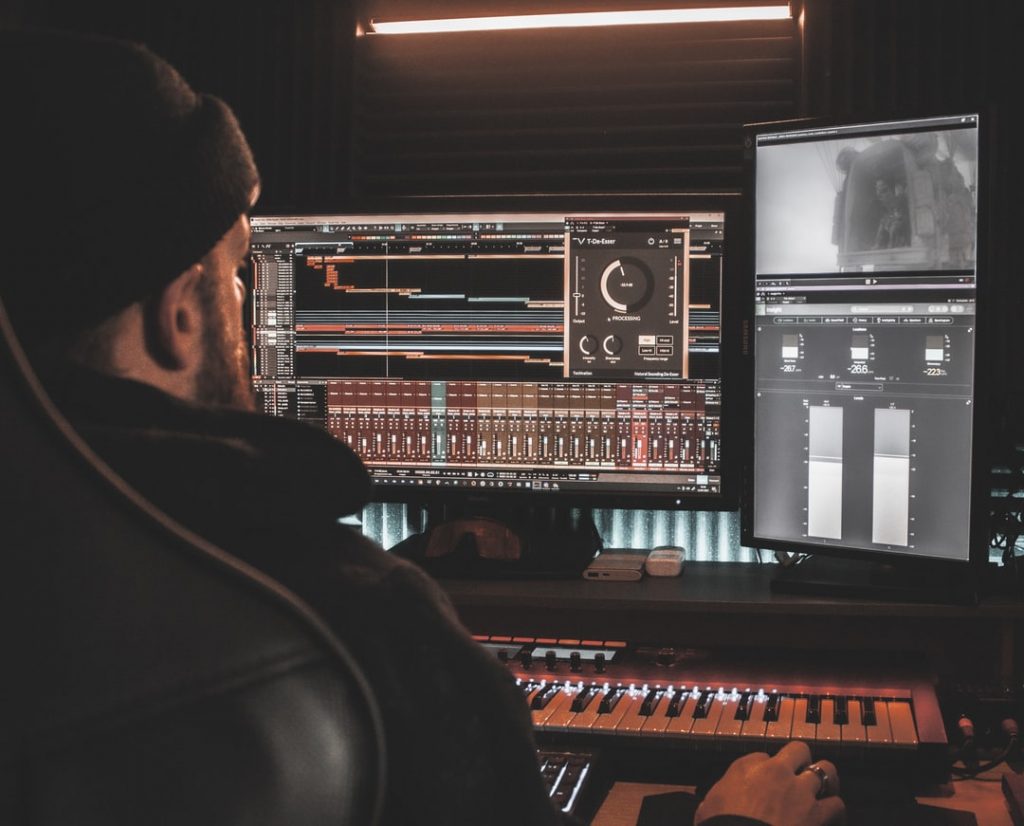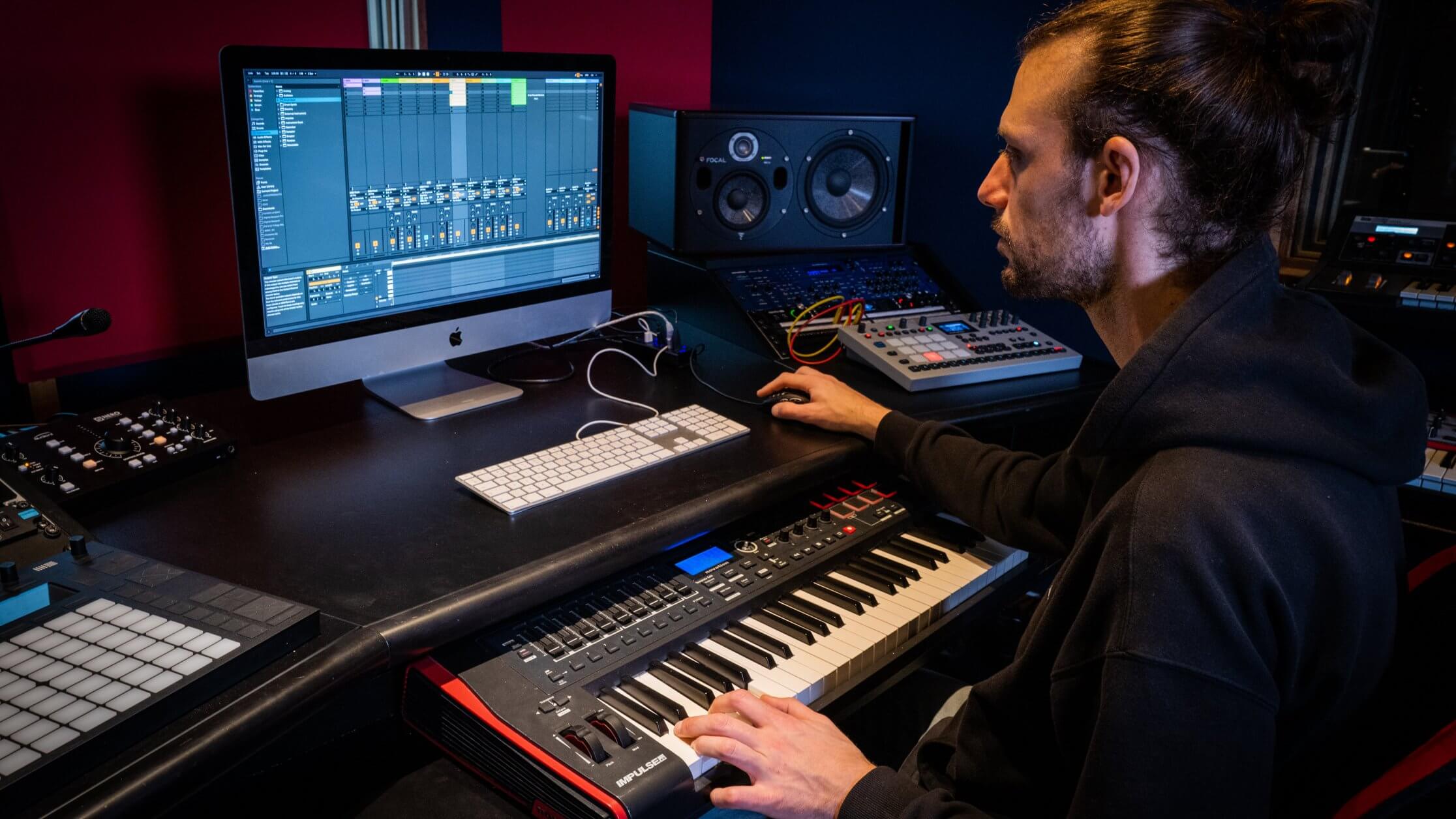Home>Production & Technology>Producer>What Major Would You Need To Be A Music Producer


Producer
What Major Would You Need To Be A Music Producer
Published: March 6, 2024
Discover the essential major and skills needed to become a successful music producer. Explore the educational path to kickstart your career in music production.
(Many of the links in this article redirect to a specific reviewed product. Your purchase of these products through affiliate links helps to generate commission for AudioLover.com, at no extra cost. Learn more)
Table of Contents
Introduction
Have you ever found yourself captivated by the magic of music production? Aspiring to be the creative force behind the next chart-topping hit or the mastermind who brings an artist's vision to life through sound? If so, you're not alone. The world of music production is an exciting and dynamic field that offers a myriad of opportunities for those with a passion for music and a talent for bringing it to life.
In this article, we will delve into the world of music production and explore the educational path that can lead you to a successful career as a music producer. Whether you're a budding musician seeking to expand your skills or a music enthusiast with a keen interest in the technical aspects of music creation, understanding the educational requirements and career prospects in this field is crucial.
From understanding the inner workings of the music industry to honing the specific skills and knowledge required for success, we will take a comprehensive look at the journey to becoming a music producer. Additionally, we'll explore the importance of choosing the right major to set yourself up for a fulfilling and rewarding career in music production.
So, if you're ready to embark on a journey through the captivating world of music production and discover the key to unlocking your potential as a music producer, let's dive in and explore the exciting possibilities that await you in this dynamic and creative industry.
Understanding the Music Industry
The music industry is a multifaceted and ever-evolving landscape that encompasses a wide array of roles, from artists and performers to behind-the-scenes professionals who play a pivotal role in shaping the sonic landscape of our world. At the heart of this industry lies the figure of the music producer, an individual responsible for overseeing the creative and technical aspects of music production. To understand the educational journey required to become a successful music producer, it's essential to grasp the inner workings of the music industry and the crucial role that producers play within it.
Music production is a dynamic and multifaceted field that requires a deep understanding of both the creative and technical aspects of music creation. Producers are tasked with bringing together various elements of a song, from composition and arrangement to recording and mixing, to create a cohesive and compelling musical piece. They work closely with artists, songwriters, and recording engineers to translate musical ideas into polished and professional recordings.
Furthermore, music producers are often involved in guiding the artistic direction of a project, offering creative input to enhance the overall quality and impact of the music. This requires a keen understanding of musical styles, trends, and audience preferences, as well as the ability to adapt to the ever-changing demands of the industry.
In addition to their creative contributions, music producers also navigate the business side of the industry, negotiating contracts, managing budgets, and overseeing the logistical aspects of music production. This multifaceted role demands a comprehensive skill set that encompasses creativity, technical proficiency, and business acumen.
Moreover, the music industry itself is constantly evolving, driven by technological advancements, shifting consumer preferences, and emerging trends. As a result, music producers must stay abreast of the latest developments in recording technology, software, and industry practices to remain competitive and relevant in the field.
In essence, understanding the music industry is integral to comprehending the role and responsibilities of a music producer. By gaining insight into the dynamic nature of the industry, aspiring producers can better prepare themselves for the challenges and opportunities that await them in this vibrant and ever-changing realm of creativity and innovation.
Skills and Knowledge Required
Becoming a successful music producer requires a diverse and well-rounded skill set, encompassing both technical expertise and creative prowess. From a deep understanding of music theory and composition to proficiency in audio engineering and production software, the skills and knowledge required for this role are multifaceted and dynamic. Let's explore the essential competencies that aspiring music producers need to cultivate to thrive in this competitive industry.
Musical Proficiency
A strong foundation in music theory, harmony, and composition forms the bedrock of a music producer's skill set. An in-depth understanding of musical structures, chord progressions, and arrangement techniques enables producers to craft compelling and harmonically rich musical pieces. Additionally, proficiency in playing musical instruments, particularly piano and guitar, provides producers with the ability to translate musical ideas into tangible compositions.
Technical Expertise
Mastery of audio engineering principles and production techniques is essential for music producers to bring their creative visions to life. This includes knowledge of sound recording, mixing, and mastering, as well as proficiency in using digital audio workstations (DAWs) and music production software. Familiarity with a variety of recording equipment and studio setups further enhances a producer's technical capabilities, allowing them to achieve professional-grade sound quality.
Creativity and Innovation
The ability to think outside the box and innovate within the realm of music production is a hallmark of successful producers. Creativity permeates every stage of the production process, from conceptualizing musical ideas to experimenting with unconventional sounds and arrangements. Producers must possess a keen ear for detail, a strong sense of musical aesthetics, and the ability to envision and actualize unique sonic experiences.
Communication and Collaboration
Effective communication and collaboration skills are paramount for music producers, as they often work closely with artists, songwriters, and recording engineers. The capacity to articulate creative ideas, provide constructive feedback, and facilitate a collaborative environment is crucial for nurturing productive working relationships and bringing out the best in musical talents.
Business Acumen
In addition to their creative and technical responsibilities, music producers must possess a solid understanding of the business side of the industry. This includes knowledge of music copyright laws, contract negotiation, project budgeting, and project management. A keen awareness of market trends and audience preferences also enables producers to make informed decisions that resonate with the target audience.
Adaptability and Resilience
The music industry is known for its dynamic and ever-changing nature, requiring producers to be adaptable and resilient in the face of evolving trends and technological advancements. Flexibility in embracing new production techniques, genres, and industry practices is essential for staying relevant and competitive in the fast-paced world of music production.
In essence, the skills and knowledge required for a music producer encompass a harmonious blend of musical proficiency, technical expertise, creative ingenuity, effective communication, business acumen, and adaptability. By honing these essential competencies, aspiring music producers can embark on a fulfilling and successful journey in the captivating realm of music production.
Choosing the Right Major
Selecting the right major is a pivotal step in the journey toward becoming a proficient music producer. While there isn't a specific major tailored exclusively for music production, several academic paths can provide aspiring producers with the knowledge, skills, and resources essential for success in the industry.
-
Music Production and Engineering: Pursuing a major in music production and engineering equips students with a comprehensive understanding of audio recording, mixing, and mastering techniques. This major often integrates practical studio experience with theoretical coursework, covering topics such as sound design, acoustics, and music technology. Students delve into the intricacies of digital audio workstations (DAWs), signal processing, and music production software, gaining hands-on experience in creating professional-grade recordings.
-
Music Composition and Theory: A major in music composition and theory focuses on honing students' musical creativity and compositional skills. This academic path delves into the fundamentals of music theory, harmony, orchestration, and arrangement, providing a solid foundation for crafting original musical pieces. Additionally, students explore diverse musical genres and styles, fostering a deep appreciation for the art of composition and the nuances of musical expression.
-
Audio Technology and Sound Design: This major emphasizes the technical aspects of sound engineering and design, offering a blend of practical training and theoretical knowledge. Students learn about sound synthesis, audio signal processing, and immersive audio technologies, gaining expertise in creating and manipulating sonic environments. The curriculum often encompasses courses in multimedia production, interactive audio, and spatial audio, preparing students to excel in the realm of sound design and audio technology.
-
Music Business and Entrepreneurship: For aspiring music producers interested in the business side of the industry, a major in music business and entrepreneurship provides valuable insights into music marketing, copyright law, artist management, and music industry trends. This academic path equips students with the knowledge and skills necessary to navigate the business aspects of music production, including project management, contract negotiation, and music publishing.
-
Interdisciplinary Studies in Music: Some universities offer interdisciplinary programs that allow students to tailor their academic journey to encompass a diverse range of musical disciplines. These programs enable students to explore music production alongside complementary fields such as film scoring, multimedia arts, or interactive media, fostering a well-rounded and versatile skill set.
Ultimately, the right major for aspiring music producers depends on their individual interests, strengths, and career aspirations. While technical proficiency in music production and audio engineering is crucial, a well-rounded education that encompasses musical creativity, technical expertise, and business acumen can pave the way for a successful and fulfilling career as a music producer. By carefully selecting a major that aligns with their passion and goals, aspiring producers can embark on a transformative educational journey that lays the groundwork for their future success in the dynamic and vibrant world of music production.
Conclusion
In conclusion, the path to becoming a proficient music producer is a dynamic and multifaceted journey that demands a harmonious blend of creativity, technical expertise, and business acumen. Aspiring music producers must not only cultivate a deep understanding of music theory, composition, and audio engineering but also possess the ability to innovate, collaborate effectively, and navigate the ever-evolving landscape of the music industry.
The educational route toward a career in music production offers a diverse array of majors, each tailored to provide students with the knowledge and skills essential for success in the field. Whether pursuing a major in music production and engineering, music composition and theory, audio technology and sound design, music business and entrepreneurship, or interdisciplinary studies in music, aspiring producers have the opportunity to immerse themselves in a transformative educational experience that equips them with the tools to thrive in the competitive world of music production.
Furthermore, the journey to becoming a music producer extends beyond academic pursuits, encompassing real-world experience, mentorship, and a relentless passion for music. Aspiring producers can benefit immensely from internships, networking opportunities, and hands-on involvement in music projects, allowing them to apply their knowledge in practical settings and gain valuable insights into the nuances of music production.
Ultimately, the key to success as a music producer lies in a relentless pursuit of excellence, a commitment to lifelong learning, and a deep passion for the art and craft of music production. By embracing the challenges and opportunities presented by the music industry, aspiring producers can carve out a niche for themselves, contribute to the sonic tapestry of our world, and leave an indelible mark on the ever-evolving landscape of music.
As you embark on your journey toward a career in music production, remember that the road may be challenging, but the rewards are boundless. With dedication, perseverance, and a steadfast commitment to honing your craft, you have the potential to make a profound impact as a music producer, shaping the soundscape of the future and bringing your creative vision to life in ways that resonate with audiences around the globe. Embrace the possibilities, harness your passion, and let the transformative power of music propel you toward a fulfilling and exhilarating career as a music producer.











